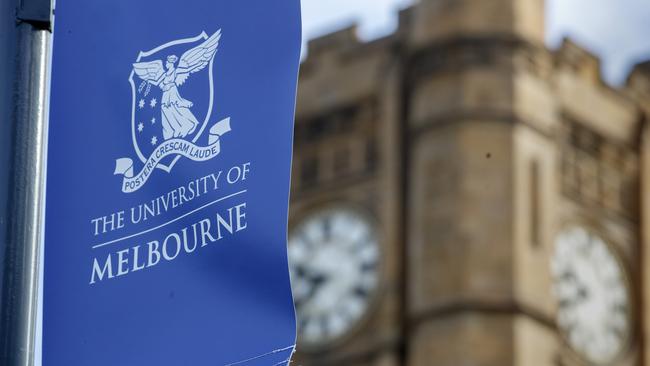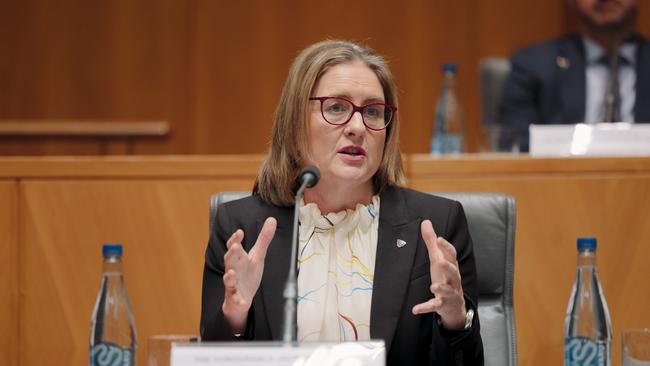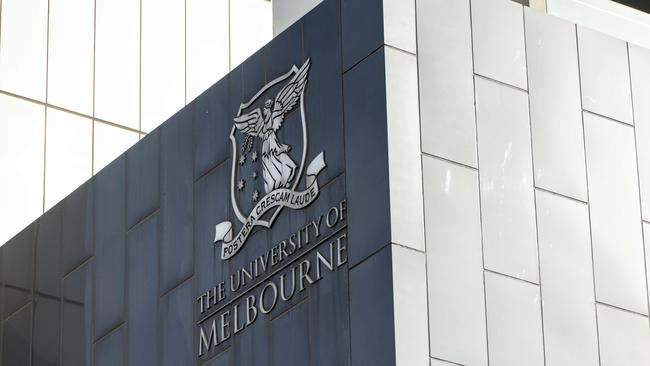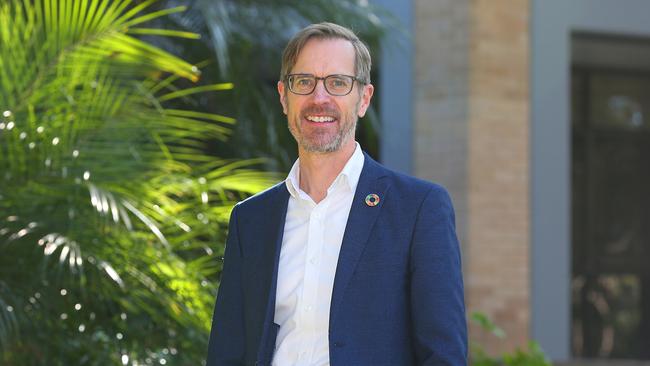NTEU report reveals Victoria’s universities have splurged $80m on consultants
The salaries of some of Victoria’s university chiefs are higher than that of Premier Jacinta Allan, as the eye-watering amount the institutions have forked out on consultants is also revealed.

Education
Don't miss out on the headlines from Education. Followed categories will be added to My News.
Victoria’s universities have splurged $80m on consultants while 65 executives are earning higher salaries than Premier Jacinta Allan — amid job cuts and wage theft claims.
The National Tertiary Education Union (NTEU) says its “Ending Bad Governance – For Good” report uncovered myriad “governance failures” at Australia’s public universities, sparking calls for a federal government inquiry.
Victorian tertiary institutions included in the national report were the University of Melbourne, RMIT, Monash, Deakin, Swinburne, La Trobe, Federation and Victoria University.
The state’s leading institutions Monash University and the University of Melbourne splashed the most cash on vice-chancellor pay packets last year, with those in the top role receiving up to three times more than Ms Allan’s almost $500,000 salary.
The two universities have also collectively spent $44.5m on external consultants and professional advice, while 31 executives earned six-figure remuneration packages above $480,000.

The NTEU said the cash splash came amid allegations of wage theft and redundancies at the expense of both current and former staff.
It claimed the University of Melbourne had underpaid more than 30,000 staff a total of $49m since 2014, while Monash University had failed to sufficiently pay 1500 staff a collective $11m.
A University of Melbourne spokesman said the institution has “publicly acknowledged and apologised to past and current employees who had been paid less than they were due for work they had performed”, and had taken an extensive program to identify and remediate affected employees.
But a Monash University spokesman said the institution had not been provided with evidence or details to substantiate the claims in the NTEU report and was “committed to paying our staff correctly in line with our enterprise agreement”.
New Monash University vice-chancellor Sharon Pickering is expected to receive a salary well below the 2023 figure, as the former vice-chancellor received a one-off payment for accrued, untaken annual and long service leave entitlements.
NTEU Monash branch president Dr Ben Eltham said he was concerned “an unelected class of highly paid senior executives (were) living very high off the public and student purse”.
“Ultimately this is the students’ money, they put in more than half of the funding into universities. I don’t see any justification for these types of salaries,” he said.
Elsewhere, 13 executives at RMIT were earning more than Ms Allan, while La Trobe allegedly spent $19m on consultancy fees - which the university said was incorrect.
Instead, a La Trobe University spokeswoman said the institution spent $11m.
Smaller universities, including Deakin, Victoria, Swinburne and Federation unis had lower consultancy expenses and had less than six executives earning more than Ms Allan, depending on the university.
Victorian university employees also highlighted issues with pay and ongoing contracts in the report.
One staffer said: “This year I signed my 14th contract after 13 consecutive one-year contracts and I have been informed that the university will never carry the risk of employees at [my research centre] for longer than two years at a time”.
NTEU national president Dr Alison Barnes said the report revealed in “shocking detail the deep governance crisis that is threatening our universities”.
“NTEU members have provided overwhelming evidence of a university governance crisis that has spiralled out of control,” she said.
“Australia urgently needs a federal parliamentary inquiry into university governance and workforce planning.”
What the universities have said about the allegations
In response to our questions about the claims made in the NTEU report, the universities provided the following responses:
University of Melbourne
A spokesman for the university said a recently negotiated enterprise agreement between the institution and NTEU, provided academics with salary increases that “retains the university’s position as one of the highest paying employers in the sector”.
This is supported by a total package of sector-leading benefits to support staff that are essential to “creating a positive student experience”, he added.
As for the consultancy expenses, the spokesman said: “The University engages consultancies to provide external expertise to better inform and guide our processes and operations”
“In 2023, the University’s expenditure on all consultants represented one per cent of total expenses.”
The spokesman also responded to the union’s allegations of wage theft, and publicly acknowledged and apologised to past and current employees who had been paid less than they were due for work that they had performed.
“We have undertaken an extensive program of work to identify and remediate current and past staff relating to staff entitlements under the 2013 and 2018 enterprise agreements and to strengthen the university’s systems and processes to prevent this happening again,” he said.
“In response to the federal government’s proposal to introduce an international student cap, the University introduced a number of commonsense measures, such as a reduction in discretionary spending and a pause on non-essential staff recruitment to vacant roles or the creation of new roles.”

Monash University
A spokesman for the university said the institution was committed to paying staff correctly in line with the enterprise agreement, underlying awards and related employment obligations.
“Monash has not been provided with evidence or details to enable us to substantiate the claims made in the NTEU’s report,” he said.
“Monash University remains committed to attempting to resolve the longstanding NTEU federal court claim by mediation. If this is not possible then Monash University will be defending the action in the Federal Court.”
The spokesman said the university included details of executive remuneration in its annual reports, in the form required by the Victorian government.
“Despite being one of the largest universities in Victoria and Australia, Monash does not have the highest number of executive staff paid over the quoted salary, and unlike a number of other universities, Monash’s definition of executive officer extends beyond the immediate executive group to include executive roles across the university, including deans and other C-suite roles.”
La Trobe University
A spokeswoman for La Trobe University said the institution had concerns about the figures from the NTEU report, including redundancy figures in 2020-21 and the expenditure on consultants in 2023.
“The consultancy expenditure claimed by the NTEU is incorrect. The total amount paid to consultants in 2023 (ex GST) was $11,055,725 – significantly less than the $19,266,213 claimed by the NTEU,” she said.
“The university engages broadly with a range of entities that provide support services in business development, research and infrastructure.”
In regards to redundancies, the spokeswoman said the 335 staff across all campuses opted to take voluntary redundancy in 2020 and a further 225 roles were made redundant in 2021 as a result of the financial impact of the Covid pandemic.
She said information regarding the remuneration of La Trobe University’s vice-chancellor and executive officers could be found in the publicly available 2023 annual report.
“The remuneration is consistent with many universities of La Trobe’s size and reflects the importance of these roles in managing a large organisation,” she said.
“Change programs in 2024 in three areas of the university were designed to ensure we can continue to focus on our growth agenda, investing in areas for which we are strong, differentiated and that support Australia’s existing and future skills.
“As many new roles were created through these change programs as well closure of roles, we cannot yet confirm numbers of redundancies in 2024 while recruitment for new roles is still underway.”  

Victoria University
A spokeswoman for Victoria University said its vice-chancellor was the lowest paid in Victoria and “has chosen not to receive a pay rise since his commencement four years ago”.
“VU limits the use of external consultants, evidenced by our 2023 spend being less than 0.3 per cent of our overall budget,” she said.
“VU is committed to fostering a thriving place to work; we are currently finalising a new enterprise agreement, and have delivered a 6 per cent pay increase to all staff in 2024 and extra leave.”
Swinburne University of Technology
A spokeswoman for the university said: “Swinburne’s focus is on people and technology working together to build a better world, and our expenditure reflects that”.
“The salaries of executives and expenditure on consultants is publicly available in our annual report,” she said.
Federation University
A spokesman for the institution said the university underwent a transformation project to “realise $40m in annualised cost savings to secure a strong and sustainable future for the university”.
“This transformation was required a decline in revenue of $79.1m between 2019-23 due to international student numbers declining around 50 per cent during this period,” he said.
“This transformation included making 163 positions redundant. A significant number of these redundancies were managed through voluntary redundancies, removing vacant positions and not renewing fixed-term contracts.”
He said 14 senior executive positions were made redundant as part of the change.
“This process started last December, when two deputy vice-chancellor positions and three director positions were made redundant to help us streamline our structure and drive down costs,” he said.
“We are reducing consultancy spend to the absolute minimum required. Sometimes there isn’t the internal ability to perform these services e.g. when implementing a new enterprise wide solution, such as we have done recently with the implementation of WorkDay across our organisation.”


